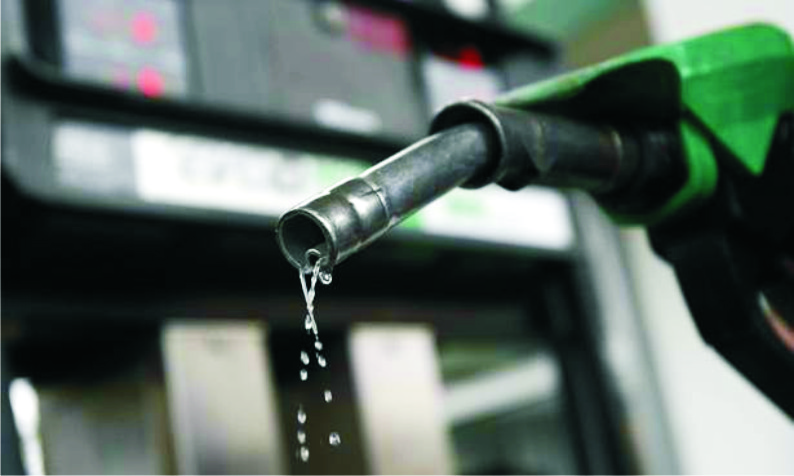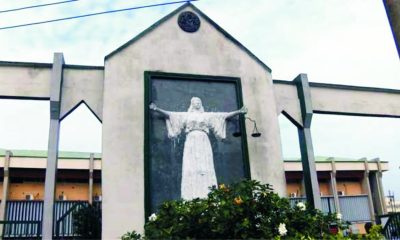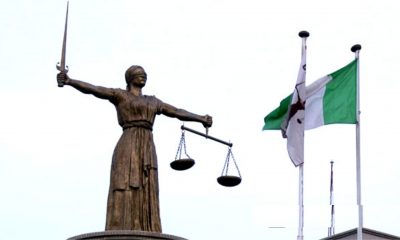Featured
No More Petrol Subsidy, Says NNPC Govs Back FG’s Action

Leveraging on the low price of crude oil and petroleum products, the Group Managing Director of the Nigerian National Petroleum Corporation (NNPC), Mr Mele Kyari, yesterday, announced that the era of subsidizing the pump price of petrol was over.
He made the disclosure on the official Twitter handle of the NNPC after he appeared in a television interview.
Kyari said: “As at today, subsidy/under-recovery is zero. Going forward, there’ll be no resort to either subsidy or under-recovery of any nature. NNPC will just be another player in the market space. But we’ll be there for the country to sustain security of supply, at the cost of the market”.
As crude oil price slumped in the international market due to the rampaging COVID-19 pandemic, the Federal Government responded by reducing the pump price of petrol from N145/litre to N125/litre in March.
It further reduced the price to N123.50/litre on April 1, after monitoring developments in the international oil market.
On the possibility of suffering another round of petrol scarcity, he said; “Today, we have a very robust products supply and distribution mechanism; from the loading depots up to fuel stations nationwide.
“We also have very good understanding with our strategic partners: the governors, marketers, depot owners, PTD, etc. There are no issues whatsoever.”
On the current developments in the international market, the NNPC GMD said: “The key issue in crude oil business is market fundamentals of demand/supply. I believe COVID-19 will subside and countries will come back to life. I don’t see oil price going below the $20 we saw last week. I’m certain, all things being equal, oil price will bounce back”.
He pointed out that the desire of the national oil company was to grow Nigeria’s production to 3 million barrels per day.
“As at yesterday, our production has, for the first time in many years, risen to 2.3mbpd. We believe this will grow and the contribution of local companies in this regard will be meaningful.”
On gas, the NNPC boss said there were ongoing plans to aggressively expand the domestic gas footprint with the delivery of the Escravos-Lagos Pipeline System (ELPS) II to double capacity from 1.1billion standard cubic feet of gas (BSCF) to 2.2BSCF and the OB3 gas pipeline to connect East and the West.
The NNPC, he revealed, would commence the construction of the Ajaokuta-Kaduna-Kano gas pipeline in the second quarter of 2020 to serve as an enabler to further boost the economic activities of the country.
Reacting to the news, governors of the 36 states in Nigeria have backed the Federal Government’s implementation of the petrol price modulation mechanism to eliminate petrol subsidy “permanently” in the country.
This decision was contained in a communique released in the early hours of yesterday by members of the Nigeria Governors’ Forum (NGF) after a meeting last Sunday to deliberate on the COVID-19 pandemic in the country.
The communiqe, signed by Governor Kayode Fayemi of Ekiti State, who is also the NGF chairman, also supported the unification of exchange rates into a single, market-determined window and the use of the market-determined exchange rate to calculate all revenues due to the federation.
The implementation of the new petrol price modulation mechanism means Nigerians will pay for petrol in line with the product’s prevailing price in the global market.
The Federal Government had announced a further reduction in petrol’s pump price to N123.50 per litre on April 1, 2020.
That was the second time it would be reducing the pump price of petrol in two weeks.
It had announced a reduction in the pump price on 18th March, 2020 from N145 to N125 following the fall in the price of crude oil in the international market.
At that time, the price of Nigeria’s Brent Crude was below $25 but it is now up to 33.24 as at today.
A statement by the Petroleum Products Pricing Regulatory Agency (PPPRA)’s Executive Secretary, Abdulkadir Saidu in Abuja had said: “PPPRA, in line with the government approval for a monthly review of Premium Motor Spirit (PMS) pump price, hereby announces Guiding PMS pump price of N123.50 per Litre.
“The Guiding price which becomes effective 1st April, 2020, shall apply at all retail outlets nationwide for the month of April, 2020.
“PPPRA and other relevant regulatory Agencies shall continue to monitor compliance to extant regulations for a sustainable downstream petroleum sector. Members of the Public and all Oil Marketing Companies are to be guided accordingly.”
Fayemi also briefed State governors on ongoing coordination with the World Bank to mobilise support for states to mitigate the economic and social cost of the COVID-19 pandemic.
He said the ongoing plans include accelerated disbursement of existing and new financing for states under the State Fiscal, Transparency, Accountability and Sustainability (SFTAS) Programme-for-Results, and mitigation and recovery support for expenditures to protect livelihoods, support local economic activity and recovery over the next 18 months to two years.
The forum thanked the Private Sector Coalition Against COVID-19 (CACOVID), set up by the Central Bank of Nigeria (CBN), for their pledge to support states increase their capacity to mitigate the spread of the virus and care for confirmed cases through the construction of isolation centres and the distribution of personal protective equipment to states.
Members underscored the need for CACOVID to work directly with the States in the distribution of palliatives.
The forum lauded the Secretary to the Government of the Federation (SGF), Mr Boss Mustapha, and his team for the commitment in leading a national response to the COVID-19 pandemic after a briefing from him on the activities of the Presidential Task Force on COVID-19 which he chairs.
Members also stressed the need for stronger collaboration with states because they are best positioned to administer palliatives to mitigate the impact of the crisis, including the distribution of food and essential materials to households to help them cope with the expected loss of income and livelihoods.
The governors renewed the importance of cancelling all deductions and deferring or restructuring all commercial debt service payments on federal government and CBN-owned debts.
Featured
Tinubu Signs Four Tax Reform Bills Into Law …Says Nigeria Open For Business

President Bola Tinubu yesterday signed into law four tax reform bills aimed at transforming Nigeria’s fiscal and revenue framework.
The four bills include: the Nigeria Tax Bill, the Nigeria Tax Administration Bill, the Nigeria Revenue Service (Establishment) Bill, and the Joint Revenue Board (Establishment) Bill.
They were passed by the National Assembly after months of consultations with various interest groups and stakeholders.
The ceremony took place at the Presidential Villa, yesterday.
The ceremony was witnessed by the leadership of the National Assembly and some legislators, governors, ministers, and aides of the President.
The presidency had earlier stated that the laws would transform tax administration in the country, increase revenue generation, improve the business environment, and give a boost to domestic and foreign investments.
“When the new tax laws become operational, they are expected to significantly transform tax administration in the country, leading to increased revenue generation, improved business environment, and a boost in domestic and foreign investments,” Special Adviser to the President on Media, Bayo Onanuga said on Wednesday.
Before the signing of the four bills, President Tinubu had earlier yesterday, said the tax reform bills will reset Nigeria’s economic trajectory and simplify its complex fiscal landscape.
Announcing the development via his official X handle, yesterday, the President declared, “In a few hours, I will sign four landmark tax reform bills into law, ushering in a bold new era of economic governance in our country.”
Tinubu made a call to investors and citizens alike, saying, “Let the world know that Nigeria is open for business, and this time, everyone has a fair shot.”
He described the bills as not just technical adjustments but a direct intervention to ease burdens on struggling Nigerians.
“These reforms go beyond streamlining tax codes. They deliver the first major, pro-people tax cuts in a generation, targeted relief for low-income earners, small businesses, and families working hard to make ends meet,” Tinubu wrote.
According to the President, “They will unify our fragmented tax system, eliminate wasteful duplications, cut red tape, restore investor confidence, and entrench transparency and coordination at every level.”
He added that the long-standing burden of Nigeria’s tax structure had unfairly weighed down the vulnerable while enabling inefficiency.
The tax reforms, first introduced in October 2024, were part of Tinubu’s post-subsidy-removal recovery plan, aimed at expanding revenue without stifling productivity.
However, the bills faced turbulence at the National Assembly and amongst some state governors who rejected its passing in 2024.
At the NASS, the bills sparked heated debate, particularly around the revenue-sharing structure, which governors from the North opposed.
They warned that a shift toward derivation-based allocations, especially with VAT, could tilt fiscal balance in favour of southern states with stronger consumption bases.
After prolonged dialogue, the VAT rate remained at 7.5 per cent, and a new exemption was introduced to shield minimum wage earners from personal income tax.
By May 2025, the National Assembly passed the harmonised versions with broad support, driven in part by pressure from economic stakeholders and international observers who welcomed the clarity and efficiency the reforms promised.
In his tweet, Tinubu stressed that this is just the beginning of Nigeria’s tax evolution.
“We are laying the foundation for a tax regime that is fair, transparent, and fit for a modern, ambitious Nigeria.
“A tax regime that rewards enterprise, protects the vulnerable, and mobilises revenue without punishing productivity,” he stated.
He further acknowledged the contributions of the Presidential Fiscal Policy and Tax Reform Committee, the National Assembly, and Nigeria’s subnational governments.
The President added, “We are not just signing tax bills but rewriting the social contract.
“We are not there yet, but we are firmly on the road.”
Featured
Senate Issues 10-Day Ultimatum As NNPCL Dodges ?210trn Audit Hearing

The Senate has issued a 10-day ultimatum to the Nigerian National Petroleum Company Limited (NNPCL) over its failure to appear before the Senate Committee on Public Accounts probing alleged financial discrepancies amounting to over ?210 trillion in its audited reports from 2017 to 2023.
Despite being summoned, no officials or external auditors from NNPCL showed up yesterday.
However, representatives from the representatives of the Economic and Financial Crimes Commission, Independent Corrupt Practices and Other Related Offences Commission and Department of State Services were present.
Angered by the NNPCL’s absence, the committee, yesterday, issued a 10-day ultimatum, demanding the company’s top executives to appear before the panel by July 10 or face constitutional sanctions.
A letter from NNPCL’s Chief Financial Officer, Dapo Segun, dated June 25, was read at the session.
It cited an ongoing management retreat and requested a two-month extension to prepare necessary documents and responses.
The letter partly read, “Having carefully reviewed your request, we hereby request your kind consideration to reschedule the engagement for a period of two months from now to enable us to collate the requested information and documentation.
“Furthermore, members of the Board and the senior management team of NNPC Limited are currently out of the office for a retreat, which makes it difficult to attend the rescheduled session on Thursday, 26th June, 2025.
“While appreciating the opportunity provided and the importance of this engagement, we reassure you of our commitment to the success of this exercise. Please accept the assurances of our highest regards.”
But lawmakers rejected the request.
The Committee Chairman, Senator Aliyu Wadada, said NNPCL was not expected to submit documents, but rather provide verbal responses to 11 key questions previously sent.
“For an institution like NNPCL to ask for two months to respond to questions from its own audited records is unacceptable,” Wadada stated.
“If they fail to show up by July 10, we will invoke our constitutional powers. The Nigerian people deserve answers,” he warned.
Other lawmakers echoed similar frustrations.
Senator Abdul Ningi (Bauchi Central) insisted that NNPCL’s Group CEO, Bayo Ojulari, must personally lead the delegation at the next hearing.
The Tide reports that Ojulari took over from Mele Kyari on April 2, 2025.
Senator Onyekachi Nwebonyi (Ebonyi North) said the two-month request suggested the company had no answers, but the committee would still grant a fair hearing by reconvening on July 10.
Senator Victor Umeh (Anambra Central) warned the NNPCL against undermining the Senate, saying, “If they fail to appear again, Nigerians will know the Senate is not a toothless bulldog.”
Last week, the Senate panel grilled Segun and other top executives over what they described as “mind-boggling” irregularities in NNPCL’s financial statements.
The Senate flagged ?103 trillion in accrued expenses, including ?600 billion in retention fees, legal, and auditing costs—without supporting documentation.
Also questioned was another ?103 trillion listed under receivables. Just before the hearing, NNPCL submitted a revised report contradicting the previously published figures, raising more concerns.
The committee has demanded detailed answers to 11 specific queries and warned that failure to comply could trigger legislative consequences.
Featured
17 Million Nigerians Travelled Abroad In One Year -NANTA

The National Association of Nigerian Travel Agencies (NANTA) said over 17 million Nigerians travelled out between 2023 and 2024.
This is as the association announced that it would be organising a maiden edition of Eastern Travel Market 2025 in Uyo, Akwa Ibom State capital from 27th to 30th August, 2025.
Vice Chairman of NANTA, Eastern Zone, Hope Ehiogie, disclosed this during a news briefing in Port Harcourt.
Ehiogie explained that the event aims to bring together over 1,000 travel professionals to discuss the future of the industry in the nation and give visibility to airlines, hospitality firms, hospitals and institutions in the South-South and South-East, tagged Eastern Zone.
He stated that the 17 million number marks a significant increase in overseas travel and tours.
According to him, “Nigerian travel industry has seen significant growth, with 17 million people traveling out of the country in 2023”.
Ehiogie further said the potential of tourism and travel would bring in over $12 million into the nation’s economy by 2026, saying it would be a major spike in the sector, as 2024 recorded about $4 million.
“The potential of tourism and travel is that it can generate about $12 million for the nation’s economy by 2026. Last year it was $4 million.
“In the area of travels, over 17 million Nigerians traveled out of the country two years ago for different purposes. This included, health, religious purposes, visit, education and others,” Ehiogie said.
While highlighting the potential of Nigeria’s tourism, he said the hospitality industry in Nigeria has come of age, saying it is now second to none.
The Vice Chairman of NANTA, Eastern Zone further said, “We are not creating an enabling environment for business to thrive. We need to support the industry and provide the necessary infrastructure for growth.”
He said the country has a lot of tourism potential, especially as the government is now showing interest in and supporting the sector.
Ehiogie emphasized that NANTA has been working to support the industry with initiatives such as training schools and platforms for airlines and hotels to sell their products.
He added, “We now have about four to five training schools in the region, and within two years, the first set of students will graduate. We are helping airlines sell tickets and hotels sell their rooms.”
Also speaking, former Chairman of the Board of Trustees of NANTA, Stephen Isokariari of Dial Travels, called for more support from the industry.
Isokariari stated, “We need to work together to grow the industry and contribute to the nation’s Gross Domestic Product.
“With the right support and infrastructure, the Nigerian travel industry has the potential to make a significant contribution to the nation’s economy.”
-

 News5 days ago
News5 days agoReps Probe Police Over Alleged ?6bn Contract Splitting, Asset Sales
-

 Niger Delta5 days ago
Niger Delta5 days agoRSNC Head Charges NAOMEW On Professionalism, Effective Service Delivery
-

 News5 days ago
News5 days agoRivers High Court Judges Begin 2025 Vacation, July 21
-
Business5 days ago
NPA Assures On Staff Welfare
-

 News5 days ago
News5 days agoFour Internet Fraudsters Get Jail Sentences In PH
-
News5 days ago
Senate Confirms Chibudom Nwuche S’South Dev. Commission Chair
-

 News5 days ago
News5 days agoTinubu Orders Civil Service Personnel Audit, Skill Gap Analysis
-

 News5 days ago
News5 days agoSenate Confirms Odey As RISEIC Chairman








